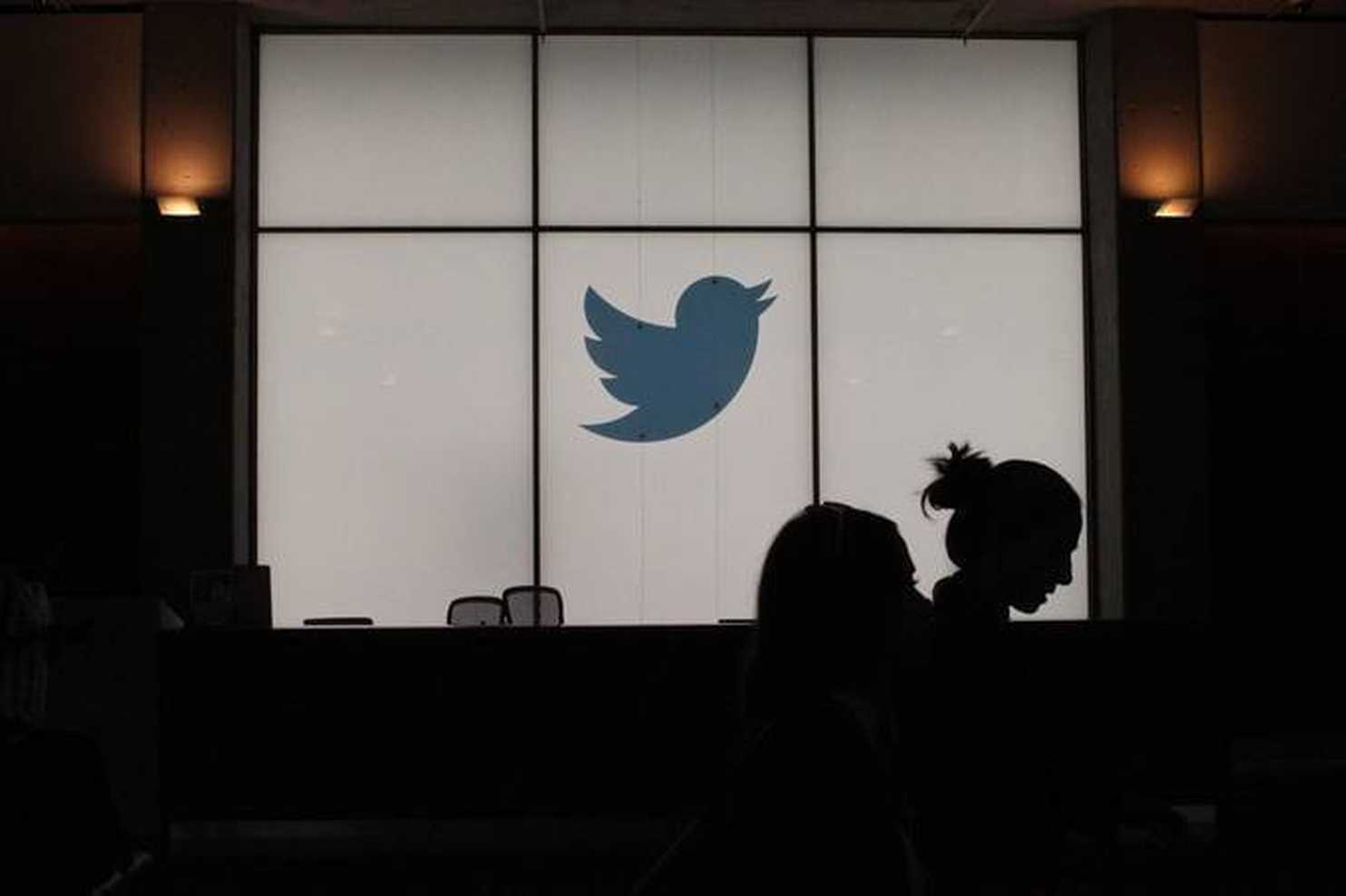with Tonya Riley
Twitter’s decision to allow employees to work from home indefinitely is setting off a debate about the future of work in the tech industry.
The social network is the largest tech company to date to offer such an option — which could give its 5,100 employees in 35 offices around the world much more flexibility over where and how they work. The company said it was already set up for a decentralized work system before the novel coronavirus pandemic, making its transition in recent months much easier, Heather Kelly reports.
Twitter says its system has been working.
“If our employees are in a role and situation that enables them to work from home and they want to continue to do so forever, we will make that happen,” Jennifer Christie, Twitter’s head of human resources, said in a blog post. “If not, our offices will be their warm and welcoming selves.”
Employees walk past an illuminated Twitter logo as they leave the company’s headquarters in San Francisco (Photo by Glenn CHAPMAN / AFP) (Photo by GLENN CHAPMAN/AFP via Getty Images)
Twitter says the option will not apply to employees who need to work with technology such as servers in person. Chief executive Jack Dorsey said the company would soon be updating its job listings to reflect the option for remote work.
But the coronavirus has forced an unprecedented experiment in remote work that more companies could continue after the pandemic.
If more tech companies are seeing that their employees can be just as productive from their homes, it could accelerate a recent push to expand decentralized workforces in the industry.
Aaron Levie, the chief executive of the file-sharing service Box, said:
Twitter announcing the option of remote work forever is definitely a bellwether for silicon valley workplace strategies. This will be a space to watch in the coming months.
— Aaron Levie (@levie) May 12, 2020
In a subsequent tweet, Levie said that Box has not yet decided what its own strategy will be, saying there’s “lots of thinking going on.”
“For software, remote work is here to stay,” Jessica Verrilli, a general partner at Google’s venture arm GV, tweeted. She said more remote work would be a good thing because it would allow more tech jobs to move outside the Bay Area.
We’ve only just begun to see the positive downstream effects of people everywhere – not just in one zip code – having access to high paying tech jobs. https://t.co/vu3vSbfj1d
— Jessica Verrilli (@jess) May 12, 2020
For many companies, the decision on how many employees can work from home permanently could come down to finances.
Any company that has seen effective remote work during the pandemic will consider expanding it to cut office costs, said Hiten Shah, an entrepreneur who has worked remotely for 17 years. Shah advises several tech companies that already have remote workforces, including Buffer and Automattic.
“Everyone’s doing the math,” Shah, whose company FYI helps with cloud collaboration tasks like finding documents, told me. “Once you follow the money, it points to the fact that this is inevitable.”
“The cost savings are just ridiculous comparing to have an office and all the things that come with that,” he added.
Even before the pandemic began, remote work was growing in popularity in the tech industry. But Shah says it was held back because venture capitalists preferred to invest in companies with offices nearby, and office proximity was also a factor in determining start-up acquisitions. He said the coronavirus has changed that calculation overnight.
Tech offices, with perks like coffee bars and more, have also been a key recruiting tool for tech titans. However, they may not be as appealing to workers amid widespread fears about public health and changes to accommodate social distancing.
Twitter and other Silicon Valley companies were among the first in the country to send their workers home amid the pandemic. Recent corporate announcements indicate their workforces could be some of the last to return — if they ever do in full. Facebook and Google have told their employees they may work remotely through 2020. And Amazon and Microsoft have informed workers who are able to they can continue to log on offsite at least through the fall.
But remote workforces come with serious trade-offs — even under normal circumstances.
Nikhil Thorat, who works for Google, said that shifting entirely to remote work could lead to more loneliness:
Permanent WFH is a bad direction, in my opinion. We’re already more isolated as a society than ever before and this promotes it even further.
I love my coworkers, going to work is rad.
And nothing beats in person communication. I will argue this point until the end of time. https://t.co/Zqg750UXU2
— Nikhil Thorat (@nsthorat) May 12, 2020
A shift to remote work could also disrupt many workers in food service, transportation and other administrative roles who support tech office operations.
It also can create greater communication challenges for teams. Hunter Walk, a partner at the venture capital firm Homebrew, said companies need to be intentional about adopting policies to support employees who are going remote.
Supporting remote work means more than just telling employees they don’t need to come into the office.
Impacts job roles, infrastructure, work processes, mentorship, benefits, etc
— 🧑🏻💻☕️ (@hunterwalk) May 12, 2020
Not every tech company is in a position to make the shift.
Going remote could be impossible for companies that produce physical goods. Apple will be beginning to bring workers back to its offices while other companies are continuing remote work, Bloomberg News reported yesterday. Elon Musk has been aggressively working to reopen the Tesla’s Fremont, Calif., plant. And Amazon’s warehouse workers have been reporting to work throughout the pandemic to ensure Americans at home can receive essential supplies. (Amazon head Jeff Bezos owns The Washington Post).
Our top tabs
Uber reportedly offered to acquire food-delivery rival Grubhub.
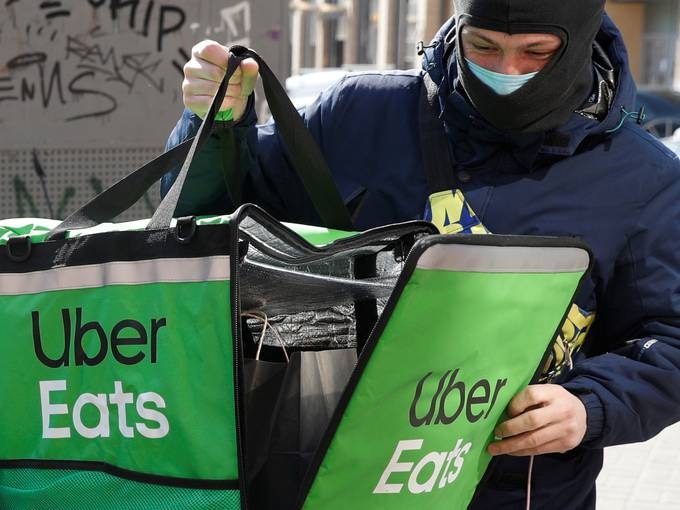
An Uber Eats food delivery courier closes a bag with an order during a lockdown, imposed to prevent the spread of the coronavirus in central Kiev, Ukraine. (Valentyn Ogirenko/Reuters)
The deliberations, first reported by Ed Hammond at Bloomberg News, could be finalized as soon as this month. Food delivery could be an area of growth for Uber as its ride-hailing business suffers amid widespread stay-at-home orders.
Consolidation could help the food delivery industry with an ongoing struggle to turn a profit — but it could also raise antitrust concerns.
House antitrust subcommittee Chair David Cicilline (D-R.I.) says the potential deal underscores his call for a moratorium on mergers during the pandemic. Politico’s Cristiano Lima:
House antitrust chair @davidcicilline issues scathing statement on Uber’s attempt to acquire Grubhub, saying it “marks a new low in pandemic profiteering” https://t.co/UgMjk6RgjP pic.twitter.com/VEPcndMyAj
— Cristiano Lima (@viaCristiano) May 12, 2020
Both companies said in independent statements to Bloomberg they are continuously looking at value-enhancing opportunities, but they declined to comment on specific merger discussions.
Uber recently announced plans to shutter its Grubhub rival Uber Eats in seven countries where the service has failed to take off. The company also recently laid off 14 percent of its workforce as it scrambles to deal with losses from steep declines in its ride-hailing services.
Facebook will pay $52 million in damages to current and former American moderators who suffered psychological consequences from the work.

A viewer of Facebook. (Damien Meyer/AFP/Getty Images)
The settlement covers thousands of current and former workers and is the first of its kind, Elizabeth Dwoskin reports. Facebook did not admit or deny harm to workers in the settlement.
The deal resolves a suit by former Facebook moderator Selena Scola alleging she developed post-traumatic stress disorder after nine months reviewing violent and disturbing images for the company. Dozens of other moderators, many of whom are contracted by the company through third-party firms, have reported similarly harmful work conditions.
Facebook agreed to make a number of changes in work conditions as part of the settlement, according to the Verge’s Casey Newton. They include:
- Providing workers with weekly sessions with mental-health professionals
- Screening moderators before hiring
- Rolling out content moderation tool changes such as muting audio by default
“We are grateful to the people who do this important work to make Facebook a safe environment for everyone. We’re committed to providing them additional support through this settlement and in the future,” Facebook spokesman Drew Pusateri said in an emailed statement.
President Trump called for California to allow Tesla to reopen its plant, offering support for Musk’s decision to reopen the car company’s Fremont facility.
Trump’s tweet yesterday follows a private call between Trump and business leaders including Musk last month, Faiz Siddiqui and Josh Dawsey report. On the call, “Musk was agitating to reopen and praising Trump” and expressed a desire to reopen by May 1.
“I do not think it represents a significant risk,” he said, according to two individuals familiar with the discussion, who spoke on the condition of anonymity because of the private nature of the interaction. Trump said that he fully agreed with Musk, the people added.
California should let Tesla & @elonmusk open the plant, NOW. It can be done Fast & Safely!
— Donald J. Trump (@realDonaldTrump) May 12, 2020
Musk thanked the president for his tweet.
Thank you!
— Elon Musk (@elonmusk) May 12, 2020
Those who always disagree have a closed mind … but, by their very nature, that won’t sink in (sigh)
— Elon Musk (@elonmusk) May 12, 2020
Musk briefly served on the president’s advisory counsel but withdrew over disagreement with Trump’s immigration ban on Muslim countries and withdrawal from the Paris climate agreement. The Tesla chief executive’s emergence as the tech industry’s symbol for reopening has put him in alignment with the president.
Hill happenings
Three senators want to institute a moratorium on Internet shut-offs during the pandemic.
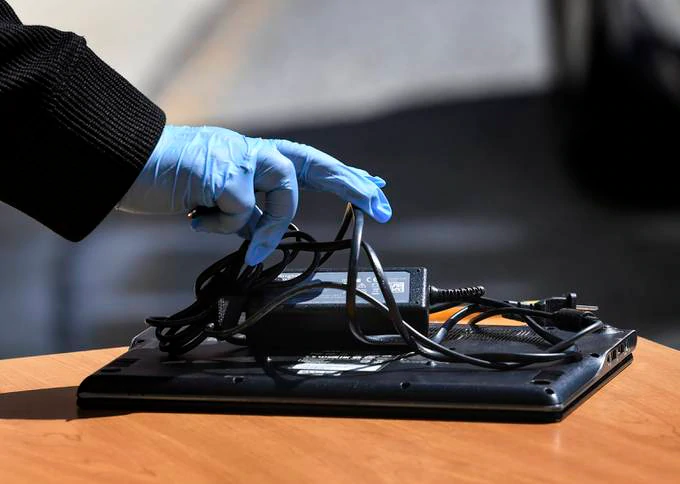
An employee prepares a Chromebook for distribution at an elementary school on March 26. (Toni L. Sandys/The Washington Post)
The legislation, led by Sens. Jeff Merkley (D-Ore.), Bernie Sanders (I-Vt.) and Ron Wyden (D-Ore.) would legally enforce a promise many service providers have already voluntarily made to the Federal Communications Commission.
A moratorium on shut-offs outlined in their bill would extend the moratorium until 180 days after the conclusion of the federal state of emergency.
Wyden and Rep. Yvette D. Clarke (D-N.Y.) also led a letter urging Senate and House leadership to audit any artificial intelligence used to combat covid-19 for racial biases.
“We are seeing the devastating and disproportionate impact covid-19 has on communities of color,” Clarke said in a statement. “During such a critical time, we must ensure that the use of artificial intelligence in combating covid-19 is not biased in providing resources to these vulnerable communities who most need it.”
Sens. Amy Klobuchar (D-Minn.), Mazie Hirono (D-Hawaii), Gary Peters (D-Mich.) and Jacky Rosen (D-N. V.) introduced legislation that would appropriate $1 billion to establish an emergency fund for college students to get online during the coronavirus pandemic. The funding would serve students at historically black colleges and universities, tribal colleges and universities as well as institutions that support Hispanic, rural and other minority students.
Inside the industry
Some Bay Area consumers are starting to cut out delivery platforms to save local businesses from steep fees.
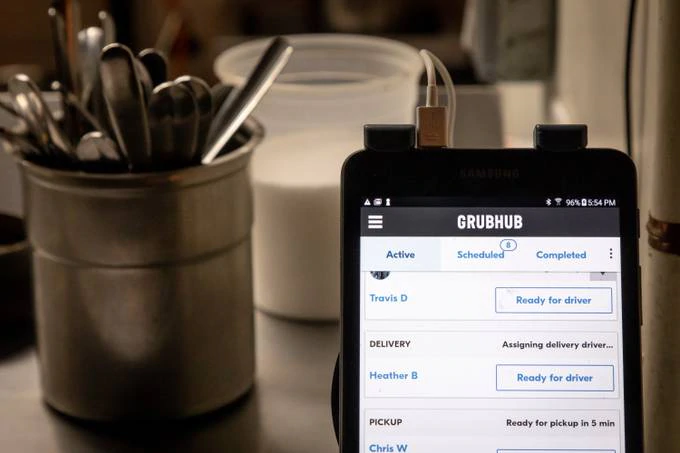
Grubhub tablet displays orders ready for pickup. (Gary He/Getty Images)
The consumer backlash highlights growing concerns that delivery apps are exploiting restaurants and their employees, Heather Kelly reports.
“I’m so interested in not lining corporate pockets right now,” said Patricia De Fonte, an estate-planning attorney in San Francisco who orders from local businesses directly. “When we come out of this, I want to have a neighborhood to come back to, and I want to go back to running errands in real life.”
Delivery platforms have marketed themselves as streamlining a complicated process for local restaurants, but the steep fees they charge for the service aren’t always worth the cost to restaurateurs.
“You’re paying out 30 percent to these delivery services and your margins are 10 percent, so it doesn’t make sense,” explains restaurateur Vega Freeman-Brady. “We don’t want to raise prices. I’d rather pay my employees more and give them a living wage.”
Cities are also drawing a hard line. San Francisco, Seattle and Washington have all passed a 15 percent cap in app delivery fees to prevent companies from fees that sometimes leave businesses with less than a of the profits on deliveries.
Delivery apps, which are adapting to keep up with consumer demand, defend their fees.
“Reducing the commissions that fund our marketplace — particularly during these unprecedented times — would force us to radically alter the way we do business in a way that could ultimately hurt those that we’re trying to help the most: customers, small businesses and delivery people,” Uber Eats spokeswoman Meghan Casserly said in a statement.
Facebook put fact-checking warning labels on 50 million pieces of covid-19-related content last month.

The Facebook app. (Andrew Harrer/Bloomberg News)
The company also removed more than 2.5 million pieces of content for the sale of masks, disinfectants and covid-19 testing kits, Facebook announced in a blog post yesterday.
But the report doesn’t “reflect the full impact of the changes we made during the pandemic,” vice president for integrity Guy Rosen wrote in a blog accompanying the report. Facebook has streamlined its moderation during the pandemic to prioritize harmful content — something that users say has left their reports about racist and obscene content unanswered.
Facebook’s Instagram also announced its enforcement data, including numbers on bullying for the first time. The company took action on 1.5 million pieces of bullying content in the past two quarters. The sister company announced new anti-bullying features yesterday including allowing users to control who tags and mentions them.
Workforce report
Thirteen state attorneys general want Amazon to provide worker safety data following reports of worker illnesses and deaths.
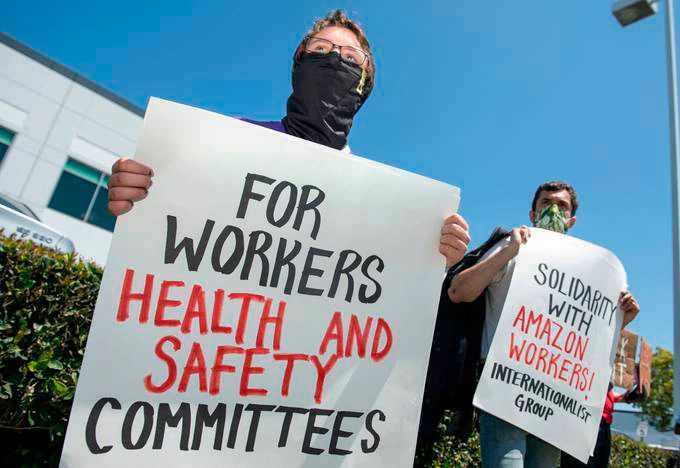
Workers protest the lack of adequate protection. (Valerie Macon/AFP/Getty Images)
The same group of attorneys general wrote the company in March urging it to improve sick-leave policies, Bloomberg News’s Chris Dolmetsch reports.
“Amazon and Whole Foods must take every possible step to protect their employees and customers during the COVID-19 pandemic,” Massachusetts Attorney General Maura Healey, who led the group, said in a statement. “We again call on these companies to provide assurances that they are complying with state laws and federal guidance aimed at keeping essential workers safe during this crisis.”
Rant and rave
The Verge’s Makena Kelly gets to the bottom of a major 2020 mystery: Whatever happened to Andrew Yang’s hologram?
I did it. At long last, I have solved the Andrew Yang hologram mystery. pic.twitter.com/T3qWQuHonC
— Makena Kelly (@kellymakena) May 12, 2020
Trending

How a small florist in Oakland, Calif., navigated a minefield of rules to sell on the make-or-break Mother’s Day weekend.
The New York Times
Bookmark this
Daybook
- The Senate Commerce Committee will host a hearing on the state of broadband amid the covid-19 pandemic today at 10 a.m.
- The Information Technology and Innovation Foundation will host a webinar “Mind the Gap: A Design for a New Energy Technology Commercialization Foundation” on today at noon.
- The Open Technology Institute will host an event on the role of technology in pandemic response efforts on May 14 at 11:30 a.m.
Before you log off
Comedian Rainn Wilson has some deep-breathing tips to deal with coroanvirus anxiety.








